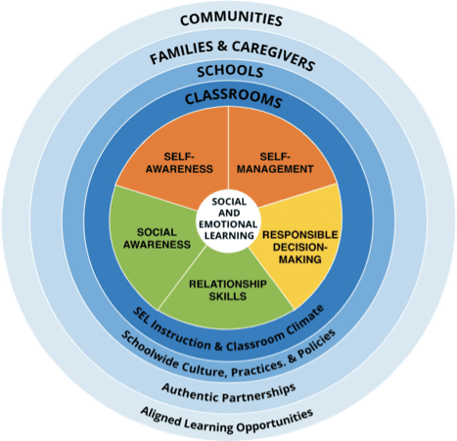Social Emotional Learning (SEL)
Overview
Social Emotional Learning (SEL) is the ongoing process of developing skills to understand and manage our emotions, make thoughtful decisions, and sustain meaningful relationships. SEL has always been an integral part of education and human development.
Nevada’s social emotional standards provide common language for understanding and supporting the process of social and emotional development.
Prioritizing social and emotional learning in Nevada is essential for promoting mental health, fostering positive relationships, and creating physically and emotionally safe learning environments for all.
Decades of research affirm that evidence-based SEL practices:
- Lead to Improved Academic Outcomes, Behaviors, and Graduation Rates
- Sustain Long-Term and Global Impacts
- Demonstrate a 11:1 Return on Investment
- Help Reduce Poverty, Improve Economic Mobility
- Improve Lifetime Outcomes and Overall Wellness
- Combat Chronic Absenteeism
- Reduce Teacher and Student Stress
- Create Safe Schools and Climates
- Promote Mental Health Supports
The Nevada Department of Education works to equip educators, families, and communities with tools and resources to support students in developing social emotional skills throughout their educational journey.
Here are some examples that are specific, observable, and measurable:
- Academic Integration: Practice and reinforce Nevada’s SEL Standards throughout the academic day. Incorporate opportunities for students to collaborate with peers, lead learning activities, discuss and debate, reflect, and problem-solve. Highlight social and emotional themes in content and help students draw comparisons to their own lives.
- Explicit Instruction: Model and teach students Nevada’s SEL Standards Self-awareness, Self-management, social awareness, relationship skills, and responsible decision-making.
- Youth Voice and Engagement: Empower young people to create positive change in their communities by participating in community service projects, youth-led initiatives, and through peer mentoring.
- Family and Community Involvement: Engage families and community partners by providing resources and workshops to reinforce Nevada’s SEL standards at home and with our out-of-school-time partners.
- Restorative Practices: Teach strategies for collaborative problem-solving and resolving conflicts peacefully, communicating effectively, and working through challenges together.
